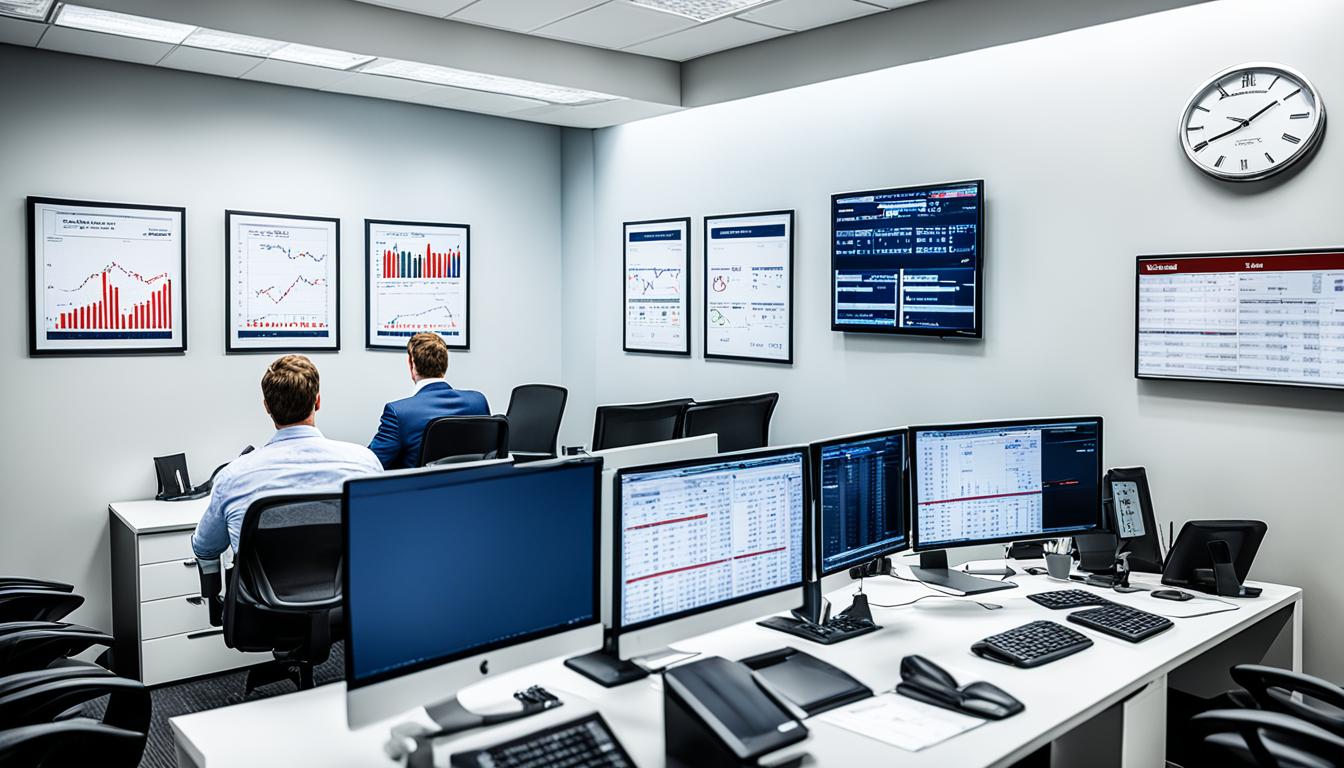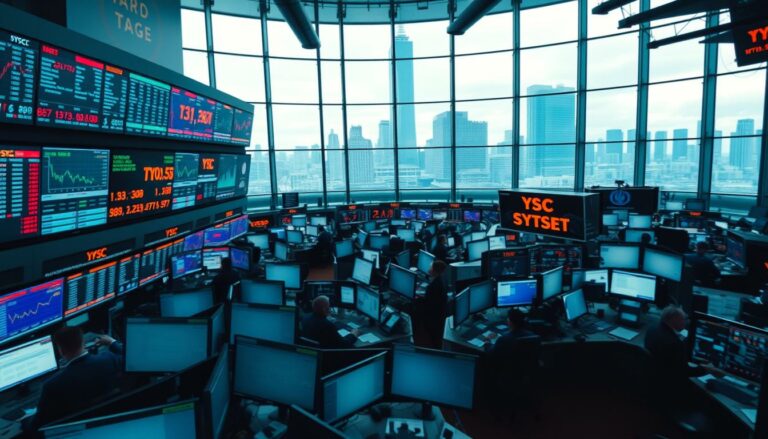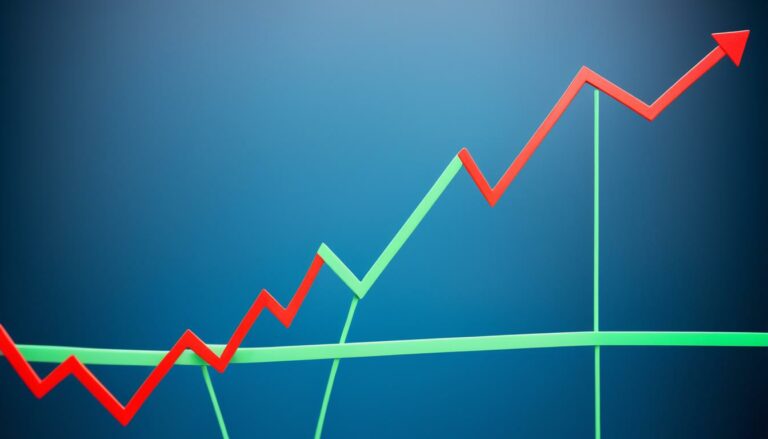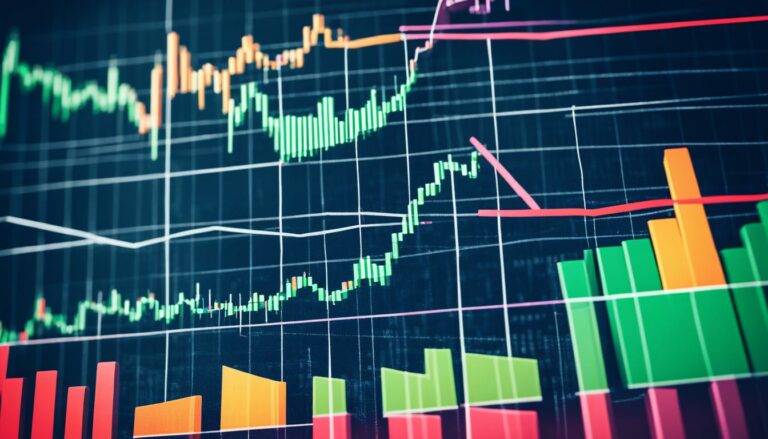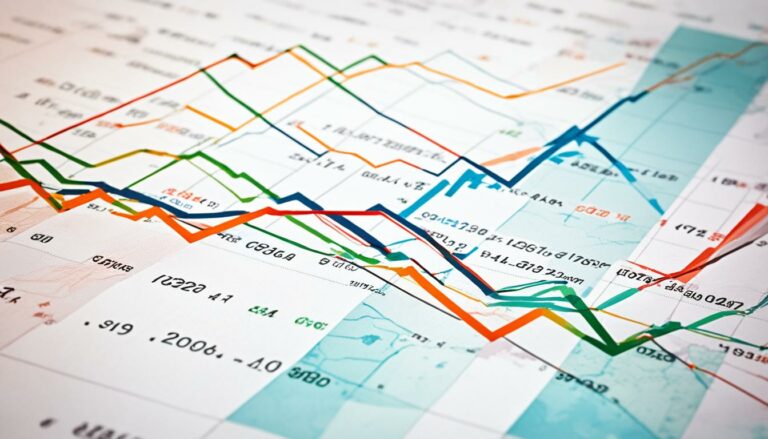Imagine you’ve saved up some cash and want to start investing. You find forex trading, which deals with big money every day. You’re keen to start trading, but check if your broker is approved first.
Wondering why this is key? The forex market is drawing more people. Yet, this can lead to unreliable brokers and scams.
Regulatory bodies safeguard your investments from risks and fraud. Choosing a forex broker with the right approval is crucial. They make sure brokers follow the rules, offering you protection.
In the US, the National Futures Association (NFA) oversees forex brokers. They ensure brokers meet capital needs, combat fraud, and keep accurate records. This work protects you and your funds.
Under US rules, those worth under $10 million and small businesses fall under customer protection. There are limits on leverage and the FIFO rule to keep trades fair. This prevents market abuse.
Remember, each country has its own forex broker regulations. For instance, Australia and Cyprus have their watchdogs, too. They make brokers follow local rules, keeping you safe.
To check a forex broker’s status, rely on the NFA’s BASIC. It quickly confirms if a US-based broker meets the rules. This tool helps verify the broker’s trustworthiness.
Forex broker regulation balances safety and economic growth in the $5 trillion market. However, it’s known for risks. Regulators work to make it fair, regularly checking brokers. This shields you from scams.
In the next part, learn more about the importance of forex broker regulation. Understanding this helps you protect your money and make wise investment choices. So, keep reading to stay informed.
The Importance of Forex Broker Regulation
Forex broker regulation is key for protecting investors and market integrity. It creates a fair environment with checks against fraud. It makes sure investors are safe.
Regulations keep traders safe by lowering fraud risks. 78% of traders want brokers that follow strict rules. This keeps the market fair.
In the U.S., the CFTC and NFA watch over forex trading. Around 44% of local traders are shielded by their rules. They make sure brokers meet high standards.
In the U.K., the FCA enforces strong market rules. 67% of online forex brokers there meet its standards. This boosts investor security.
Brokers in Cyprus follow EU laws, giving them access to all European markets. This framework offers a clear and honest place for traders.
The ASIC in Australia takes care of forex firms. It makes and enforces laws to protect traders. This is to ensure a safe trading market.
Regulation helps maintain the forex market. In the U.S., both the CFTC and NFA work hard for fair trading. This ensures traders are treated right.
Brokers make money from spreads and fees. But, many fees have been cut because of heavy competition. Some offer free or low-cost trading to attract more customers.
Investors should pick brokers carefully. They must look into the broker’s regulatory status. A good broker will clearly show its name and license number on its site.
Yet, people must be careful even with regulated brokers. Do your checks on the broker’s background. This step is key to avoid fraud.
The Role of Regulatory Oversight in Forex Trading
Regulation helps solve broker-customer conflicts. It checks that brokers play fair, especially in their own trades. This helps ensure an honest market.
Before opening a forex account, investors can check the NFA site or reviews on Investopedia. These give info on a broker’s rules. They help investors choose wisely.
In the end, forex broker regulation builds trust and guards against fraud. It makes sure trading is open and fair. This is vital for a stable global financial market.
How Forex Brokers are Regulated in the U.S.
In the United States, Forex brokers have to follow strict rules. This is to keep investors safe and the market fair. The rules are made and checked by the National Futures Association (NFA) and the Commodity Futures Trading Commission (CFTC).
The NFA is key in making sure brokers do right by their customers. It focuses on stopping fraud and making sure trading is fair and clear.
NFA’s Capital Requirements
Forex brokers must have enough money to cover what their customers might need. This helps protect people’s money and lowers the chances of a broker going broke.
Knowing brokers have enough money makes customers feel safer about their investments.
Fraud Prevention and Record-Keeping
Stopping fraud is the NFA’s big job. It goes after dishonest brokers and makes them pay for cheating people. Since 2007, it has collected over $200 million in fines and to repay losses.
Brokers have to keep very good records too. This makes sure they can show exactly what they’re doing and helps checks to be thorough.
Reporting Requirements and Leverage Limitations
The NFA wants to see brokers’ finances often. This and other info must be shared regularly. It helps keep things open and fair for everyone.
For its part, the NFA also limits how much risk traders can take with leverage. It prevents new traders from making big mistakes that could cost a lot.
The NFA’s work makes the Forex market in the U.S. more stable and trusted by those who invest in it.
| Regulatory Body | Number of Regulated Brokerages | Number of Registered Entities | Number of Employees |
|---|---|---|---|
| National Futures Association (NFA) | 4,000+ | 650,000+ | 3,400+ |
Key Provisions of U.S. Forex Regulations

The United States works hard to make forex trading safe for investors. They set rules to keep the market fair. Important rules include limits on how much you can borrow, how much money companies need, dealing amounts, tracking paperwork, and not letting people bet against themselves.
Leverage Limitations
In the U.S., they have rules about how much investors can borrow for forex trading. They do this to protect people from losing too much. For the main money pairs, the most you can borrow is 50 times what you have. For the less traded pairs, you can only borrow 20 times. These rules stop investors from taking too big of risks that could hurt them.
Capital Requirements
Forex brokers that want to work in the U.S. must have a certain amount of money set aside. This is to make sure they can pay their customers back if they make a big bet. If a bet is to sell, the broker needs to keep enough cash to cover the whole value of the bet. If the bet is to buy, they need to keep the cost of that bet to one side.
Regulatory Reporting
Telling the truth and watching what you should are big parts of the forex rules in the U.S. Brokers have to report regularly to show they are playing by the book. This helps keep an eye on the market, see risks early, and make sure everyone is following the rules. Also, the CFTC shares a report every Tuesday that shows what big traders are doing in the market.
Hedging
In the U.S., you can’t make two bets at once in the same money pair. They do this to keep the market clear and to stop people from trying to trick the system. This way, everyone knows what’s really going on with the money prices.
Protection of Customer Funds
U.S. forex rules also say brokers must keep customers’ money somewhere safe. This can be only at certain banks in the U.S. or other big countries. This keeps customers’ money safe from being used the wrong way. Also, brokers check often to make sure they have enough cash to cover what they owe customers.
The U.S. rules are there to make trading fair and safe. Knowing these rules helps traders feel more confident and lowers their risks.
Different Regulations for Forex Brokers
Different countries have their own rules for forex brokers. Each country has organizations that check if brokers follow the rules. Countries like the U.S. have strict rules to keep small investors safe. It is smart for traders to check if a forex broker is legitimate before opening an account.
Some websites might seem like a good deal but they could be risky. They might let you trade with a big lever or say they have low fees. But these sites might not follow the right rules. Traders should pick a broker that is allowed to work in their own country.
Comparing Regulatory Approaches
How strict or relaxed the rules are can differ from place to place. Some areas want to attract more forex businesses so they make it easier for them. But this might mean there are fewer protections for people who trade.
Others, like Cyprus, the UK, and Australia, have strict rules for everyone’s safety.
Brokers that don’t follow the rules can get in big trouble. They might lose their license or have to pay fines. It’s important for traders to be careful and choose brokers that play by the rules.
Ensuring Investor Protection
The goal of these rules is to make sure trading is fair and honest. Different groups help protect money that people put in forex trading. This makes the trading world a more trustworthy place.
For instance, groups like CySEC in Cyprus help protect up to €20,000 for people who are eligible.
Rules also make brokers tell traders about the risks. Keeping good records helps make trading clearer and safer for everyone.
Impact of Geographic Restrictions
Some places, like China, have special rules for their own traders. They do this to keep their money safe.
Traders need to know about these rules. It’s also important to follow the right tax laws and report any money they make from trading.
The Role of Regulatory Bodies
Groups all over the world watch over forex trading. They help make sure everyone plays by the same rules. This trust helps traders feel safe.
Getting a license shows that a broker meets the right standards. This tells traders that the broker is someone they can trust.
Verifying Regulatory Status
Before trading, it’s key to check a broker’s rules. Look on the broker’s site or check with the right regulators.
Tools like the NFA’s Basic can help you learn about brokers in the U.S. Make sure to do your homework to protect your money well.
The table below provides a list of major international regulatory bodies for Forex brokers:
| Regulatory Body | Country/Region |
|---|---|
| CySEC | Cyprus |
| FCA | United Kingdom |
| ASIC | Australia |
| IFSC | Belize |
| CNMV | Spain |
| BaFin | Germany |
| CONSOB | Italy |
| FSCA | South Africa |
| AFM | Netherlands |
| MFSA | Malta |
| Financial Commission | Global |
| VFSC | Vanuatu |
| CIMA | Cayman Islands |
| MAS | Singapore |
| NFA | United States |
| FINMA | Switzerland |
| FMA | New Zealand |
| IIROC | Canada |
| SCB | Thailand |
| SCA | United Arab Emirates |
| Mwali (MISA) | Comoros |
Regulatory Bodies for Forex Brokers in Other Countries
Forex brokers follow rules set by different regulatory bodies around the world. These groups are key to keeping forex trading honest and protecting traders from scams. Each country has its own way of making sure forex trading is safe. Let’s see who’s in charge in some places:
Australia: Australian Securities and Investments Commission (ASIC)
The Australian Securities and Investments Commission (ASIC) manages the financial market in Australia. It oversees forex brokers closely to protect Australian traders. ASIC works under Australia’s Corporation Law (1990).
Cyprus: Cyprus Securities and Exchange Commission (CySEC)
Cyprus regulates its forex brokers through the Cyprus Securities and Exchange Commission (CySEC). CySEC made a detailed set of rules for forex trading, focusing on fairness and honesty.
United Kingdom: Financial Services Authority (FSA)
In the United Kingdom, the Financial Services Authority (FSA) watches over forex brokers. The FSA’s role shows how important rules are in UK forex trading.
South Africa: Financial Sector Conduct Authority (FSCA)
In South Africa, the Financial Sector Conduct Authority (FSCA) is in charge. It makes sure brokers meet the rules, stands up for South African traders, and keeps the market steady.
Switzerland: Swiss Federal Banking Commission (SFBC)
Swiss forex brokers are kept in line by the Swiss Federal Banking Commission (SFBC). The SFBC’s mission is to help the financial market stay secure, look out for investors, and treat traders fairly.
These examples show how different countries oversee forex trading. Countries like Japan, Canada, Israel, Malta, and Vanuatu also have their own ways of making trading safe. Every trader needs to know the rules in their broker’s country and check if they follow them before starting to trade. Making sure a broker is honest is very important. This is because rules can be different from place to place, and checking a broker’s record matters a lot.
Table: Regulatory Bodies for Forex Brokers
| Country | Regulatory Body |
|---|---|
| Australia | Australian Securities and Investments Commission (ASIC) |
| Cyprus | Cyprus Securities and Exchange Commission (CySEC) |
| United Kingdom | Financial Services Authority (FSA) |
| South Africa | Financial Sector Conduct Authority (FSCA) |
| Switzerland | Swiss Federal Banking Commission (SFBC) |
Verifying a Forex Broker’s Regulatory Status
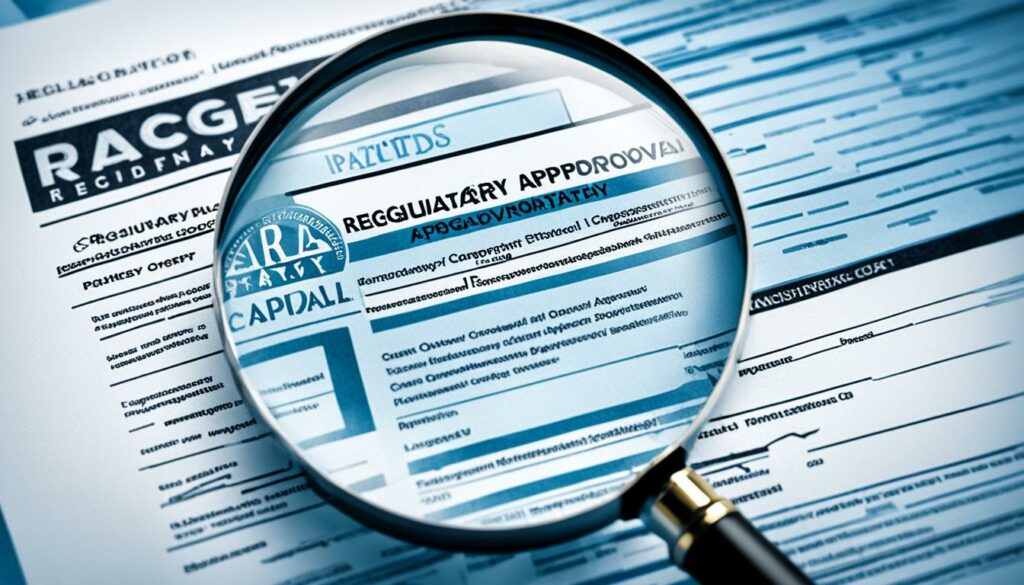
When you think about investing with a forex broker, checking their regulatory status is key. This ensures they follow rules to protect investors. Different places have various rules for brokers, so it’s crucial to look into this.
Use the NFA Background Affiliation Status Information Center (BASIC) to check a broker’s status online. This is run by the National Futures Association for U.S.-based forex brokers.
Enter the broker’s NFA ID or their name into the BASIC system. This lets you see if the broker is following the rules. Always use the correct information, as brokers might go by other names.
Using BASIC gives traders peace of mind and clear information. You can see if the broker is registered and if they’ve broken any rules before. This is key to knowing the broker is honest and follows the law.
Also, look into resources like the Securities and Exchange Commission (SEC) and FINRA. These and state regulators offer helpful info about brokers. They can help traders be really careful before investing.
Regulators are there to protect investors. They can punish brokers for doing wrong, including fraud. This system ensures brokers treat their clients fairly and honestly.
Ensuring Investor Protection
Checking a broker’s regulatory status is all about keeping investors safe. Most bad actions come from brokers who aren’t following any rules.
A good broker must meet certain financial, background, and ethical standards. This is to make sure they do business the right way.
Stay away from brokers without a license, especially in risky markets. They might try to save money, but this could mean they’re not looking out for your best interest.
Importance of Regulatory Verification
It’s crucial to look into a forex broker’s regulatory status. This step helps traders make smart choices and keep their money safe. By verifying, traders know they’re working with a reliable broker.
| Key Points: |
|---|
| Regulatory verification ensures compliance and investor protection |
| NFA Background Affiliation Status Information Center (BASIC) allows traders to check a forex broker’s regulatory status |
| Other regulatory resources like SEC, FINRA, and state securities regulators provide additional information |
| Regulatory agencies issue fines, revoke licenses, and ban brokers for fraudulent activities |
| Verifying regulatory status promotes fairness, transparency, and ethical conduct in business practices |
Finding if a forex broker is legit safeguards your money. This process wards off scams and frauds in the trading world.
Regularly check your investments and report anything suspicious right away. This, along with verifying brokers, will keep your money safe.
The Importance of Forex Broker Regulation for Investor Protection

Forex broker regulation is key for keeping investors’ money safe. It helps make sure the Forex market is secure. So, as an investor, picking a regulated broker is important to protect your funds.
Regulated brokers, like AAAFx, are open about their prices and risks. They follow clear rules. This means your money is safe when you invest with them.
AAAFx is overseen by the Hellenic Capital Market Commission (HCMC) and the Financial Sector Conduct Authority (FSCA). This means they follow strict regulations, giving investors confidence in their trustworthiness.
They also provide protections like making sure you won’t lose more than you invest. For EU clients, AAAFx offers insurance up to €30,000. This kind of protection doesn’t often happen with unregulated brokers.
Regulated brokers make trading fair and clear. They show how they handle orders and what fees they charge. This openness helps you trust their service.
If you ever have a problem, regulatory bodies can help solve it. They make sure any issues are dealt with fairly. This keeps the relationship between you and your broker balanced.
Regulated brokers help you stay safe by offering tools to manage risk. They might have features like protecting you from going into debt. And they provide tips on how to handle your investments wisely.
They also keep your personal and financial info secure. By investing in good tech, they protect you from cyber threats. This means your data is safe with them.
Having great customer support is also very important. Regulated brokers, such as AAAFx, have teams ready to help you 24/7. This makes your trading experience more positive and dependable.
Adhering to rules is a big part of what makes regulated brokers trustworthy. They keep up with the latest regulations. This reduces the legal risks for both you and them.
Regulated brokers also aim for top-notch trading systems. They provide you with the best tools and safety. This shows their commitment to offering great trading opportunities.
So overall, the rules that regulate brokers are incredibly important. They ensure brokers act openly and safely. This makes trading a less risky venture for you. And it helps you concentrate on reaching your trading goals.
The Complexity of Forex Broker Regulation
Financial rules in the forex world are hard and always changing. They change to match what’s happening in the market. Regulators try to protect investors without making the market less competitive. Too few rules can be bad for investors, but too many can slow down the economy. They aim to set rules that keep the market honest and let it grow.
Forex broker rules are complicated because different places have different laws. This makes a patchwork of rules around the world. The U.S. has strong laws managed by the CFTC and NFA. Japan’s FSA is very strict, and the EU has its own set of rules. Places like Singapore and the UK also carefully watch over forex. But then there are some places, like Belize or the British Virgin Islands, with few to no real rules. Brokers in these areas might not be safe to use because they’re not well-regulated.
New rules make things even more complicated. Like how ESMA made rules for lower leverage in Europe. This made some brokers leave the market. The FCA in the UK has rules for marketing crypto to make it clearer for buyers. And the CFTC in the U.S. wants brokers to share more about their trades. All these changes add to the challenge of understanding who to trust in forex trading.
Traders are told to pick regulated brokers. Regulated brokers follow strict rules to behave fairly and honestly. This means a safer experience for traders. If a regulated broker does something wrong, traders can complain. The agency in charge can check and punish bad behavior. So, trading with a regulated broker is the smart move for a trader wanting some safety.
So, the forex world is full of rules to try and make it safe and fair. Traders need to keep up with these rules and follow them with their brokers. Choosing a regulated broker helps protect your money within these rules.
Ensuring Safety and Compliance in Forex Brokerage Operations
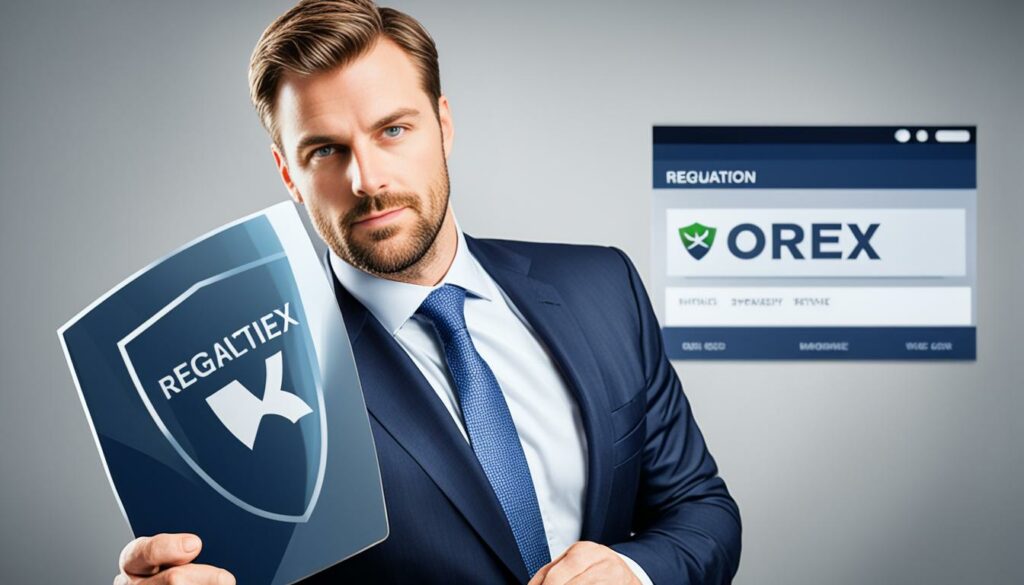
Keeping forex brokerage operations safe and honest is key. They follow strict rules set by regulators. This is to keep your money safe, keep the business fair, and follow good rules in the forex market.
Brokers must follow rules to keep money safe and protect investments. They keep your money separate from their own. This way, if they have money problems, your money is still safe.
They also must be clear about their rules, how they trade, and what they charge. This helps you choose wisely.
When you trade with these brokers, you get lots of good things. They can’t cheat, so trading is fair for everyone.
There are also ways to solve problems if they happen. This means you’re protected from bad acts or scams. In the US, the NFA makes sure brokers play by the rules, protecting you and making sure they act right.
Brokers that the NFA watches are safer and more honest. They can’t lie or trick you.
The NFA also helps solve issues if something goes wrong. They make sure trading stays fair for everyone.
| Regulatory Body | Main Responsibilities |
|---|---|
| The Financial Conduct Authority (FCA) in the United Kingdom | Regulates forex brokers in the UK, ensuring compliance with financial and ethical standards. |
| National Futures Association (NFA) and Commodity Futures Trading Commission (CFTC) in the United States | Focused on investor protection, ethical market conduct, compliance enforcement, and maintaining financial stability. |
| Australian Securities and Investments Commission (ASIC) | Oversees forex brokers in Australia, enforcing regulations for investor protection and market integrity. |
| Investment Industry Regulatory Organization of Canada (IIROC) | Regulates forex brokers in Canada, ensuring adherence to financial and ethical standards. |
As a trader, you can check if a forex broker is regulated. Look at their licenses and official info. Choose brokers that follow rules and keep high standards.
Importance of Choosing the Right Forex Regulator
Picking the right forex regulator is key in forex trading. It keeps you safe, ensures rules are followed, and offers a safe place to trade. It’s important to check where a forex broker is registered to know what rules and protections they follow. Regulators like the NFA, FSC, CySEC, and ASIC watch over forex brokers’ actions.
When you choose a regulated forex broker, you can trust they follow the law to protect you. They put your money in a safe place, are honest about costs and give you ways to solve problems. These brokers also follow rules on how much you can borrow for trading and are easy to reach for help.
Regulated brokers also make sure your money is secure and trading is fair. They have great trading platforms for you to use, with tools to help you decide when to trade. They let you try their platform for free before using real money. And they help you learn better ways to trade with free lessons and tools.
Choosing a broker that is regulated is your first step to success in trading. It makes sure you and your money are safe and that you’re trading fairly. Always take time to find the right forex regulator for a good start on your trading journey.
